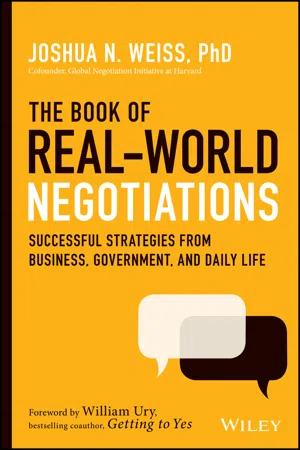
The Book of Real-World Negotiations
Successful Strategies From Business, Government, and Daily Life
Joshua N. Weiss
- English
- ePUB (apto para móviles)
- Disponible en iOS y Android
The Book of Real-World Negotiations
Successful Strategies From Business, Government, and Daily Life
Joshua N. Weiss
Información del libro
Real world negotiation examples and strategies from one of the most highly respected authorities in the field
This unique book can help you change your approach to negotiation by learning key strategies and techniques from actual cases. Through hard to find real world examples you will learn exactly how to effectively and productively negotiate. The Book of Real World Negotiations: Successful Strategies from Business, Government and Daily Life shines a light on real world negotiation examples and cases, rather than discussing hypothetical scenarios.It reveals what is possible through preparation, persistence, creativity, and taking a strategic approach to your negotiations.Many of us enter negotiations with skepticism and without understanding how to truly negotiate well. Because we lack knowledge and confidence, we may abandon the negotiating process prematurely or agree to deals that leave value on the table.
The Book of Real World Negotiations will change that once and for all by immersing you in these real world scenarios. As a result, you'll be better able to grasp the true power of negotiation to deal with some of the most difficult problems you face or to put together the best deals possible.This book also shares critical insights and lessons for instructors and students of negotiation, especially since negotiation is now being taught in virtually all law schools, many business schools, and in the field of conflict resolution.Whether you're a student, instructor, or anyone who wants to negotiate successfully, you'll be able to carefully examine real world negotiation situations that will show you how to achieve your objectives in the most challenging of circumstances.The cases are organized by realms—domestic business cases, international business cases, governmental cases and cases that occur in daily life. From these cases you will learn more about:
- Exactly how to achieve Win-Win outcomes
- The critical role of underlying interests
- The kind of thinking that goes into generating creative options
- How to consider your and the other negotiator's Best Alternative to a Negotiated Agreement (BATNA)
- Negotiating successfully in the face of power
- Achieving success when negotiating cross-culturally
Once you come to understand through these cases that negotiation is the art of the possible, you'll stop saying "a solution is impossible." With the knowledge and self-assurance you gain from this book, you'll roll up your sleeves and keep negotiating until you reach a mutually satisfactory outcome!
Preguntas frecuentes
Información
1
Mistakes Negotiators Make, and What Do Great Negotiators Do Anyway?
Skepticism toward Negotiation, and Common but Inaccurate Myths
A Winner and a Loser – and Nobody Wants to Lose
The False Promise of Compromise
- “Your Majesty, this woman and I live in the same house. Not long ago my baby was born at home, and three days later her baby was born. Nobody else was there with us.
- “One night while we were all asleep, she rolled over on her baby, and he died. Then while I was still asleep, she got up and took my son out of my bed. She put him in her bed, then she put her dead baby next to me.
- “In the morning when I got up to feed my son, I saw that he was dead. But when I looked at him in the light, I knew he wasn't my son.”
- “No!” the other woman shouted. “He was your son. My baby is alive!”
- “The dead baby is yours,” the first woman yelled. “Mine is alive!”
- They argued back and forth in front of Solomon, until finally he said, “Both of you say this live baby is yours. Someone bring me a sword.”
- A sword was brought, and Solomon ordered, “Cut the baby in half! That way each of you can have part of him.”
- “Please don't kill my son,” the baby's mother screamed. “Your Majesty, I love him very much, but give him to her. Just don't kill him.”
- The other woman shouted, “Go ahead and cut him in half. Then neither of us will have the baby.”
- Solomon said, “Don't kill the baby.” Then he pointed to the first woman, “She is his real mother. Give the baby to her.”
- Everyone in Israel was amazed when they heard how Solomon had made his decision. They realized that God had given him wisdom to judge fairly.1